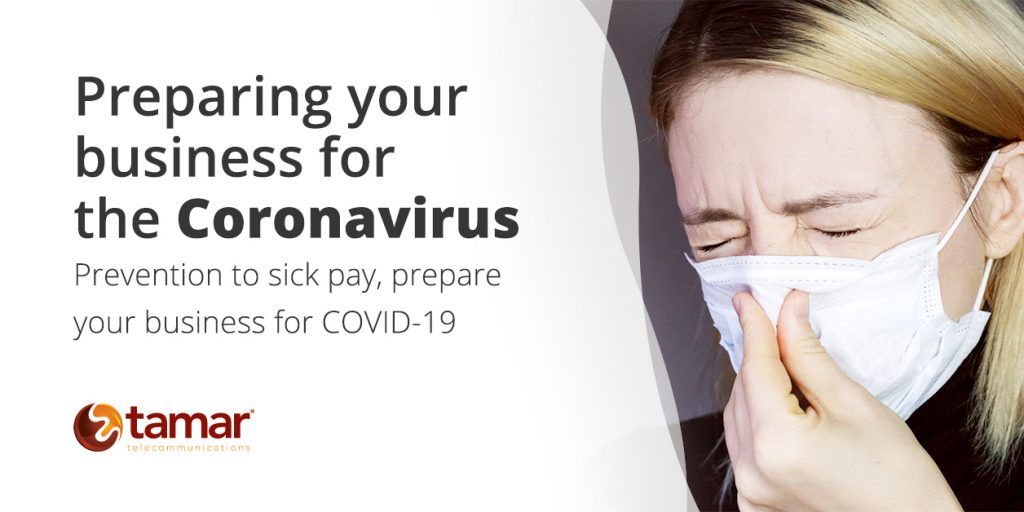This article provides key guidance and information sources on how businesses can respond to the novel coronavirus, COVID-19.
What is the coronavirus?
Coronavirus is a category of viruses. The coronavirus outbreak that is currently of global concern is a strain of coronavirus called COVID-19. Symptoms of infection with COVID-19 include cough, difficulty in breathing, and fever. The virus is understood to pose an elevated risk to people with weakened immune systems, older people, and those with long-term illnesses.

Preparations to put in-place at work
Stock up on hand sanitiser
Anti-viral hand sanitiser can reduce transmission from infected people to others via objects in the workplace, and can reduce the risk of people catching the virus after touching disease vectors.
Hand sanitisers usually come in the form of gels, foams or wipes.Researchers have determined that all three delivery methods produce “significantly reduced viral counts on hands.”
Businesses should ensure hand sanitiser is fully stocked-up in bathrooms, kitchens and communal areas. Those wishing to take a thorough approach could also consider installing gel dispensers near entrance points to workspaces.
Supplies of hand sanitiser are currently low in the UK and other countries affected by the coronavirus, so businesses may find it is necessary to shop around. One option could be bulk-buying from stockists based in countries which have no confirmed cases of COVID-19, provided those stockists can deliver within an appropriate timeframe. Some UK pharmacy chains are currently rationing hand sanitiser products.
Tissues
Encouraging staff to use a tissue when they sneeze or cough can prevent the spread of coronavirus into the air and onto surfaces.
We advise placing a box of tissues within reach of workstations, and/or distributing packs of tissues to staff.
Deliver guidance to staff
Effective guidance for staff can help reduce coronavirus transmission among the workforce. Employers can communicate guidance via internal newsletters, presentations or team meetings.
Public Health England (PHE) has the following advice to prevent people catching and spreading COVID-19:
● Cover your mouth and nose with a tissue or your sleeve (not your hands) when you cough or sneeze;
● Put used tissues in the bin straight away;
● Wash your hands with soap and water often – use hand sanitiser gel if soap and water are not available;
● Try to avoid close contact with people who are unwell;
● Clean and disinfect frequently touched objects and surfaces;
● Do not touch your eyes, nose or mouth if your hands are not clean.
Download and print NHS posters on how to wash hands correctly.

Draw up a disaster recovery plan (DRP)
The potential scope of CORVID-19’s impact on UK workers and consumers is hard to gauge, but it is already clear that some businesses are experiencing significant negative effects (the collapsed airline Flybe is one high-profile example).
Businesses can preempt and lessen some of the worst effects of major events, such as coronavirus at epidemic levels, by formulating a disaster recovery plan (DRP).
A DRP document will typically have the following sections:
- Objectives
- Contact details of key personnel;
- Profile of operations/applications (technical operations of the business and the application it uses);
- Inventory profile;
- Information services backup procedures;
- Disaster recovery procedures (incl. emergency response procedures, backup operation procedures, and recovery action procedures); and
- Disaster recovery mobile site plan (in case operations need to be taken off-site).
Here’s a free DRP plan template, including guidance on how to use it.
Many DRPs emphasise IT systems over other business operations. If your business is largely offline-based, swap some of the IT-related aspects of DRP planning for more relevant categories, e.g. the food prep processes in a bakery.
Are businesses required to pay staff who have self-isolated for 14 days?
The government has announced emergency changes to statutory sick pay (SSP) rules, designed to help contain the coronavirus.
● The amount of SSP employers must pay employees is set to go up by £40, from £94.25 per week to £134.25 per week.
● SSP is to be payable from the first day of an employee’s sick leave (not the fourth day, as is usual).
These measures only apply to employees who are entitled to SSP. Employees earning less than £118 per week are not protected by the measures.
With that said, there are strong moral, practical and reputational arguments in favour of granting sick pay to all self-isolated employees. A decision not to pay such employees could provoke a negative response from employees and the public, and may also discourage at-risk staff from self-isolating, leading to an elevated risk of viral spread throughout a business’s staff. In such cases, the best thing for the employee seems likely to be the best thing for the business, too.
When should employees self-isolate?
Government guidance on when to self-isolate is evolving with the spread of the coronavirus. At the time of writing (March 5th), the guidance is that employers should stick to their usual policies on sickness, except when the employee concerned has travelled to specific parts of the world. These regions have been placed into two categories which signal the appropriate response:
Category 1: “Travellers should self-isolate, even if asymptomatic, use the 111 online coronavirus serviceto find out what to do next. Go home or to your destination and then self isolate.”
Category 2: “Travellers do not need to undertake any special measures, but if they develop symptoms they should self-isolate and call NHS 111.”
Category 1 locations are currently limited to areas of China, Italy and South Korea, and any part of Iran.
See the government’s full list of Category 1 and Category 2 locations.
Sources for latest information
Gov.uk: COVID-19 guidance for employers and businesses
BBC News: Coronavirus outbreak (topic)







